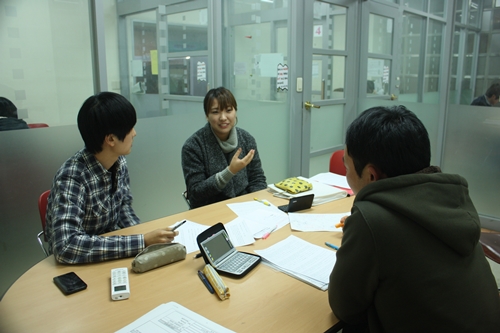취업은 결코 어렵지 않다.
<#323 Cover Story>
Employment Is No Longer a ‘Narrow Path’
By Son Hyun-jee, Student Editor
“While looking for employment information, I have come in and out of dozens of online job-search sites day after day. Studying at private institutes to prepare for TOEIC Speaking is basic, not to mention taking classes during vacations to get better grades.“ This is a common sentiment among the students of Chonnam National University (CNU).
To pass through a strait gate named ‘employment’, students build up their profiles with high academic scores, foreign language ability certifications, overseas volunteer experiences, club activities and prizes from contests. However, according to the employment rate of four-year-course colleges, which have more than 3000 graduates every year, CNU ranked 28th with a 48% employment rate, announced by the Ministry of Education, Science and Technology on October 23rd. CNU also ranked 8th out of 10 major national universities as of June 1st according to the report of a task force team from the Division of Employment Support (DES) of CNU.

In an interview with the Chonnam Tribune, Professor Chung Woo-yang, the Vice President for Student Affairs, said that the low employment rate is correlated with students’ preparation for a job and the employment support system of CNU. The Office of Student Affairs (OSA) needs to develop and run an effective system for employment with a consistent policy. If students would like to get a job that they want, they should prepare well in advance. I expect that many students choose their career path early by using various programs, including Career Mapping and Self-development operated by the OSA.”
The OSA also provides employment-related opportunities such as personalized talent development programs, industry-academia cooperation activities, and open recruitment interviews with various companies. The programs which are designed to reinforce CNU students’ employment competitiveness have produced remarkable results. 22 CNU students entered into Samsung Electronics through the Samsung-CNU Talent Program with ten million won in scholarships in March. Four students were also accepted to be official workers through a Local Talent Employment program from a recommendation made in May. After being selected through an official aptitude test and an interview, they followed an individualized talent instruction program and eventually all of them were employed as official workers. In July, executives of LG visited CNU in person and recruited eight students into LG Electronics Mobile Communications in September.
Ko Jun-gook (Senior, School of Business Administration) who participated in several job support programs said, “It is true that students of provincial universities like CNU have less information and opportunities than those from universities in Seoul, but employment is not surely a narrow path if they make good use of the information and the programs from the DES. Above all, the most important thing is for students to decide what they want to do with their life after graduation, in the lower grades of university.”
Professor Chung said that some may be critical of the efforts of universities to increase graduate employment rate by offering diverse supports and raise the question ‘Is CNU a training place for employment?’, but now it is time to find ways for students and to have interests in their employment. However, the employment rate among graduates from local universities cannot be simply raised by their individual efforts or the university’s supports. The government should focus on creating jobs and providing opportunities to work with young people because the current youth unemployment rate is a serious social problem.
In the 18th presidential election of Korea, two main candidatespledged that students from local universities will have more opportunities. Park Geun-hye, presidential candidate of the ruling party, promised ‘employee performance evaluation’ from the public sector and insisted on a competence-oriented society in the joint conference of National University Press on November 1st. Moon Jae-in, presidential candidate of the opposition party, also promised ‘Blind Recruitment’ so that companies cannot discriminate against job applicants on the basis of their academic background, in the town hall meeting of National University Press on October 13th. Moon also made a remark on the ‘obligatory allocation employment for local university graduates’, which may become another criterion to evaluate a company according to whether it carries out the system well or not. Hopefully these election promises will not end up as empty pledges for the presidential election. The policy for local universities should be developed continuously and come into action in the very near future.
손현지 기자
qhsmldkdl@naver.com

